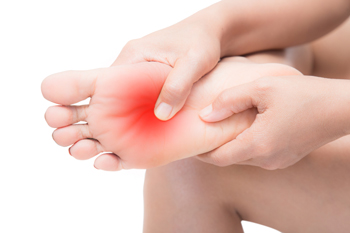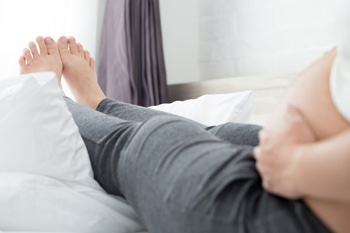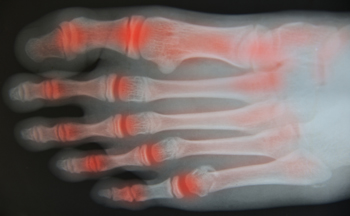Connect With Us
Blog
Items filtered by date: January 2022
Can Osteoarthritis Occur in the Ankles?
Osteoarthritis in the ankles is a very painful condition which causes the cartilage that protects bones in the ankle to deteriorate. This leads to bones rubbing against each other, swelling, stiffness, tenderness and intense pain in the ankle, and a decreased ability to walk or bend and flex your ankles. Several factors can increase your risk of developing osteoarthritis (OA) in the ankles, such as previous ankle injuries, recurrent high-impact stress on the ankles, misaligned joints, genetics, obesity and age. Your podiatrist can diagnose OA with a physical exam to test joint tenderness and swelling, X-rays, a gait analysis to assess your stride and foot and ankle biomechanics, and blood tests to distinguish OA from other forms of arthritis. There are many ways a podiatrist can help you manage the symptoms of OA, from lifestyle changes and physical therapy to various braces and orthotic devices, topical creams, pain relievers, and steroid injections. In severe cases of OA, surgery may be beneficial to remove spurs and loose cartilage, fuse the ankle to reduce pain, or replace damaged cartilage and bone with prosthetic parts (arthroplasty). If you believe you may have osteoarthritis in the ankle, it is suggested that you make an appointment as soon as possible to begin treatment.
Arthritis can be a difficult condition to live with. If you are seeking treatment, contact Philip K. Schrumpf, DPM from Active Feet Clinic. Our doctor can provide the care you need to keep you pain-free and on your feet.
Arthritic Foot Care
Arthritis is a joint disorder that involves the inflammation of different joints in your body, such as those in your feet. Arthritis is often caused by a degenerative joint disease and causes mild to severe pain in all affected areas. In addition to this, swelling and stiffness in the affected joints can also be a common symptom of arthritis.
In many cases, wearing ill-fitting shoes can worsen the effects and pain of arthritis. Wearing shoes that have a lower heel and extra room can help your feet feel more comfortable. In cases of rheumatoid arthritis, the arch in your foot may become problematic. Buying shoes with proper arch support that contour to your feet can help immensely.
Alleviating Arthritic Pain
- Exercises that stretch the foot can prevent further pain and injury and increase mobility
- Most of the pain can be alleviated with anti-inflammatory drugs, heat, and topical medications
- Massages can help temporarily alleviate pain.
It is best to see your doctor for the treatment that is right for your needs and symptoms. Conditions vary, and a podiatrist can help you determine the right method of care for your feet.
If you have any questions, please feel free to contact our office located in Missoula, MT . We offer the newest diagnostic tools and technology to treat your foot and ankle needs.
Your Baby’s Foot Development
 If you’ve ever stopped to look at your baby’s feet, you’ve likely noticed that they are different from a typical adult’s feet. Rather than being born with fully-formed, mini adult feet, children’s feet go through several stages of development. At birth, a baby’s feet are soft and flat. Their bones start out as pieces of cartilage and their toes are almost all equal in length and surrounded by a layer of fat. From 9 to 24 months, a baby’s feet will still be flat, but their bones are slowly developing with gaps between them. At age 2 and beyond, the soft fat in the foot will slowly start to disappear, and the arches of the feet will become visible. The small foot bones develop further, eventually merging so that each foot contains 26 bones. To learn more about healthy foot development and how to best care for your baby’s feet, please consult with a podiatrist.
If you’ve ever stopped to look at your baby’s feet, you’ve likely noticed that they are different from a typical adult’s feet. Rather than being born with fully-formed, mini adult feet, children’s feet go through several stages of development. At birth, a baby’s feet are soft and flat. Their bones start out as pieces of cartilage and their toes are almost all equal in length and surrounded by a layer of fat. From 9 to 24 months, a baby’s feet will still be flat, but their bones are slowly developing with gaps between them. At age 2 and beyond, the soft fat in the foot will slowly start to disappear, and the arches of the feet will become visible. The small foot bones develop further, eventually merging so that each foot contains 26 bones. To learn more about healthy foot development and how to best care for your baby’s feet, please consult with a podiatrist.
The health of a child’s feet is vital to their overall well-being. If you have any questions regarding foot health, contact Philip K. Schrumpf, DPM of Active Feet Clinic. Our doctor can provide the care you need to keep you pain-free and on your feet.
Tips for Keeping Children's Feet Healthy
- Make sure their shoes fit properly
- Look for any signs of in-toeing or out-toeing
- Check to see if they have Clubfoot (condition that affects your child’s foot and ankle, twisting the heel and toes inward) which is one of the most common nonmajor birth defects.
- Lightly cover your baby’s feet (Tight covers may keep your baby from moving their feet freely, and could prevent normal development)
- Allow your toddler to go shoeless (Shoes can be restricting for a young child’s foot)
- Cut toenails straight across to avoid ingrown toenails
- Keep your child’s foot clean and dry
- Cover cuts and scrapes. Wash any scratches with soap and water and cover them with a bandage until they’ve healed.
If you have any questions, please feel free to contact our office located in Missoula, MT . We offer the newest diagnostic and treatment technologies for all your foot care needs.
Causes and Symptoms of Diabetic Neuropathy
 There are three kinds of diabetic neuropathy, caused by prolonged high blood sugar levels that can damage nerves throughout your body. Peripheral neuropathy damages nerves on the extremity – arms and hands, as well as the legs and feet. This can lead to serious foot problems that get worse slowly over months, and possibly years. Autonomic neuropathy affects the central nervous system, while focal neuropathy targets one particular nerve, usually in the wrist, thigh or foot. One of the main symptoms of diabetic neuropathy is the absence of feeling in the toes and feet. This can be a cause for concern, as sores or other injuries may go unnoticed. It’s a good idea to check your feet daily for areas that may cause problems. Unfortunately, it is often the case that they go unnoticed until the problem worsens. The main way to prevent this condition from developing in the first place is to monitor blood sugar levels every day. It’s also a good idea to maintain a healthy body weight, eat nutritious foods, and avoid alcoholic beverages. If you think you may have diabetic neuropathy, it’s a good idea to make an appointment with a podiatrist who can conduct a screening and determine the best course of treatment for your foot health.
There are three kinds of diabetic neuropathy, caused by prolonged high blood sugar levels that can damage nerves throughout your body. Peripheral neuropathy damages nerves on the extremity – arms and hands, as well as the legs and feet. This can lead to serious foot problems that get worse slowly over months, and possibly years. Autonomic neuropathy affects the central nervous system, while focal neuropathy targets one particular nerve, usually in the wrist, thigh or foot. One of the main symptoms of diabetic neuropathy is the absence of feeling in the toes and feet. This can be a cause for concern, as sores or other injuries may go unnoticed. It’s a good idea to check your feet daily for areas that may cause problems. Unfortunately, it is often the case that they go unnoticed until the problem worsens. The main way to prevent this condition from developing in the first place is to monitor blood sugar levels every day. It’s also a good idea to maintain a healthy body weight, eat nutritious foods, and avoid alcoholic beverages. If you think you may have diabetic neuropathy, it’s a good idea to make an appointment with a podiatrist who can conduct a screening and determine the best course of treatment for your foot health.
Neuropathy
Neuropathy can be a potentially serious condition, especially if it is left undiagnosed. If you have any concerns that you may be experiencing nerve loss in your feet, consult with Philip K. Schrumpf, DPM from Active Feet Clinic. Our doctor will assess your condition and provide you with quality foot and ankle treatment for neuropathy.
What Is Neuropathy?
Neuropathy is a condition that leads to damage to the nerves in the body. Peripheral neuropathy, or neuropathy that affects your peripheral nervous system, usually occurs in the feet. Neuropathy can be triggered by a number of different causes. Such causes include diabetes, infections, cancers, disorders, and toxic substances.
Symptoms of Neuropathy Include:
- Numbness
- Sensation loss
- Prickling and tingling sensations
- Throbbing, freezing, burning pains
- Muscle weakness
Those with diabetes are at serious risk due to being unable to feel an ulcer on their feet. Diabetics usually also suffer from poor blood circulation. This can lead to the wound not healing, infections occurring, and the limb may have to be amputated.
Treatment
To treat neuropathy in the foot, podiatrists will first diagnose the cause of the neuropathy. Figuring out the underlying cause of the neuropathy will allow the podiatrist to prescribe the best treatment, whether it be caused by diabetes, toxic substance exposure, infection, etc. If the nerve has not died, then it’s possible that sensation may be able to return to the foot.
Pain medication may be issued for pain. Electrical nerve stimulation can be used to stimulate nerves. If the neuropathy is caused from pressure on the nerves, then surgery may be necessary.
If you have any questions, please feel free to contact our office located in Missoula, MT . We offer the newest diagnostic and treatment technologies for all your foot care needs.
Heel Pain Can Be Treated!
Ways to Reduce Swollen Feet During Pregnancy
 Many pregnant women experience swollen feet and ankles, mainly because of hormonal changes, as increased production of progesterone slows down digestion and circulation. Further, a buildup of blood to support the pregnancy means there is more fluid to build up in your feet. Other causes include humid weather, standing on your feet too long, and wearing tight clothing and shoes. Some ways to keep down the swelling (edema) include eating less salt and more foods containing potassium, cutting back on caffeine, drinking lots of water, and keeping your feet elevated as often as possible. In addition, you can take a short walk each day, wear compression socks, and avoid standing for long periods. Swelling normally develops in the third trimester and may continue after you give birth, but eventually it will subside. If the swelling in your feet becomes severe or painful, it is suggested that you seek the attention of a podiatrist immediately for a diagnosis and treatment plan.
Many pregnant women experience swollen feet and ankles, mainly because of hormonal changes, as increased production of progesterone slows down digestion and circulation. Further, a buildup of blood to support the pregnancy means there is more fluid to build up in your feet. Other causes include humid weather, standing on your feet too long, and wearing tight clothing and shoes. Some ways to keep down the swelling (edema) include eating less salt and more foods containing potassium, cutting back on caffeine, drinking lots of water, and keeping your feet elevated as often as possible. In addition, you can take a short walk each day, wear compression socks, and avoid standing for long periods. Swelling normally develops in the third trimester and may continue after you give birth, but eventually it will subside. If the swelling in your feet becomes severe or painful, it is suggested that you seek the attention of a podiatrist immediately for a diagnosis and treatment plan.
Pregnant women with swollen feet can be treated with a variety of different methods that are readily available. For more information about other cures for swollen feet during pregnancy, consult with Philip K. Schrumpf, DPM from Active Feet Clinic. Our doctor will attend to all of your foot and ankle needs.
What Foot Problems Can Arise During Pregnancy?
One problem that can occur is overpronation, which occurs when the arch of the foot flattens and tends to roll inward. This can cause pain and discomfort in your heels while you’re walking or even just standing up, trying to support your baby.
Another problem is edema, or swelling in the extremities. This often affects the feet during pregnancy but tends to occur in the later stages.
How Can I Keep My Feet Healthy During Pregnancy?
- Wearing orthotics can provide extra support for the feet and help distribute weight evenly
- Minimize the amount of time spent walking barefoot
- Wear shoes with good arch support
- Wear shoes that allow for good circulation to the feet
- Elevate feet if you experience swelling
- Massage your feet
- Get regular, light exercise, such as walking, to promote blood circulation to the feet
If you have any questions please feel free to contact our office located in Missoula, MT . We offer the newest diagnostic and treatment technologies for all your foot and ankle needs.
Blog Archives
- August 2024
- July 2024
- June 2024
- May 2024
- April 2024
- March 2024
- February 2024
- January 2024
- December 2023
- November 2023
- October 2023
- September 2023
- August 2023
- July 2023
- June 2023
- May 2023
- April 2023
- March 2023
- February 2023
- January 2023
- December 2022
- November 2022
- October 2022
- September 2022
- August 2022
- July 2022
- June 2022
- May 2022
- April 2022
- March 2022
- February 2022
- January 2022
- December 2021
- November 2021
- October 2021
- September 2021
- August 2021
- July 2021
- June 2021
- May 2021
- April 2021
- March 2021
- February 2021
- January 2021
- December 2020
- November 2020
- October 2020
- September 2020
- August 2020
- July 2020
- June 2020
- May 2020
- April 2020
- March 2020
- February 2020
- January 2020
- December 2019
- November 2019
- October 2019
- September 2019
- August 2019
- July 2019
- June 2019
- May 2019
- April 2019
- March 2019


